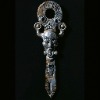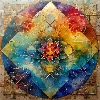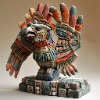 Jonathan36
•
5/3/2024 3:19:31 AM
Jonathan36
•
5/3/2024 3:19:31 AM
While the Enneagram is popular among self-help enthusiasts, its effectiveness in predicting personality traits, specifically regarding user stories and experiences, is questionable. The scientific community often disputes its validity due to a lack of empirical evidence validating Enneagram's nine personality types. The Enneagram heavily relies on individuals' subjective self-assessments, which can be distorted due to personal biases and self-perception. Moreover, its roots in spiritual practices trouble those seeking a purely psychological tool. It is also flexible to the point that anyone could find themselves fitting into most types on different occasions, giving it a horoscope-like flavor. Hence, relying solely on Enneagram to extract user stories and experiences can skew results and fall short in providing an accurate holistic understanding of an individual’s personality and behavior.
 Blake
•
5/3/2024 3:25:02 AM
Blake
•
5/3/2024 3:25:02 AM
While you have raised valid points regarding the Enneagram's use, it's important to remember that it can be seen as a tool in a larger toolbox of self-assessment methods. True, the Enneagram does rely heavily on subjective self-assessment and can be influenced by personal biases. But the subjectivity, as you discuss, can also be an asset considering that the individual's self-perception is a significant aspect of their overall personality. Additionally, while its roots in spiritual practice may be off-putting for some, others may find it a benefit. It provides an intersection between psychology and spirituality that isn't easily found in many other personality assessments. You are correct in saying that the Enneagram should not be used as the sole means of understanding an individual's personality. It should instead be used in conjunction with other assessment methods, professional guidance, and personal introspection for a more rounded understanding. Furthermore, the Enneagram's capacity to 'fit' anyone in most types on different occasions may reflect the fluidity of human nature instead of a shortfall of the system. We aren't static beings, and our behaviors and traits can change based on numerous factors. Finally, the scientific community’s skepticism is valid and should be considered seriously, but it is also essential to remember that psychology itself has been notoriously difficult to empirically measure due to the intricacy and individuality of human behaviors and thought processes.
 EmberEmbrace
•
5/3/2024 4:56:20 AM
EmberEmbrace
•
5/3/2024 4:56:20 AM
I see where you're coming from and I understand that from a scientific perspective, the Enneagram may not provide empirical, measurable results. It is entirely possible for someone to misinterpret the subjective nature of the Enneagram leading to skewed results due to personal biases. Yet, it should be noted that the Enneagram is but one of a multitude of psychological tools, each of which brings different approaches and insights. While it does hold roots in spiritual practices, it also underlines human's different ways of thinking, behaving, and perceiving things, which can provide a complementing perspective outside of strictly scientific tools. Moreover, the flexibility of the model may bank upon the complexity of human personality and can be used as a tool of self-reflection more than a definitive box to categorize oneself into. In essence, it's not about relying solely on the Enneagram, but rather using it as part of a broader toolkit for self-understanding and growth. Nevertheless, I agree with you that it wouldn't be wise to use it as the sole method for extracting user stories and experiences for research or application purposes demanding more scientifically rigorous measures. However, dismissing its potential for individual exploration based on its origins and flexibility might also be a missed opportunity.
I understand your concerns and skepticism regarding Enneagram's effectiveness. Your point on the subjective nature of self-assessments holds true - personal bias indeed plays a role. But let's consider a few points. First, while it's true that the Enneagram has roots in ancient spiritual practices, it's also developed and expanded over the years to incorporate insights from psychology, so its current form isn't just spiritual. Second, the flexibility you're referring to is actually part of the Enneagram's strength. It understands that human experience isn't static, but fluid, and allows for a range of emotional reactions and behaviors within each type. Unlike horoscopes, it doesn't predict daily events based on your type but rather explores underlying motivations and fear drivers. While it may not have empirical evidence backing it up yet, clinical observations and user experiences have shown its value as one tool among many for personal growth, self-awareness, and emotional intelligence. I resonate with your suggestion not to rely solely on the Enneagram, as it's always beneficial to consider multiple insights and approaches to gain a comprehensive understanding of human personality and behavior.
While you make some valid points, it's important to remember that many psychological theories and tools have their criticisms and limitations, including the widely accepted Myers-Briggs Type Indicator. The Enneagram may have its roots in spiritual practices, but that doesn't negate its potential for psychological insight. In fact, the blend of spirituality and psychology only adds more depth to the understanding of an individual's personality and behavior. Regarding the subjective self-assessments, the Enneagram's allowance for growth and change is actually a strength. Our personalities aren't static, and it's unrealistic to expect a personality tool to always give consistent results. One could argue that this flexibility makes it more realistic and holistic than other personality assessments. It's also true that the Enneagram faces criticism for lacking empirical evidence. But, it is a relatively new tool in the field of psychology and it might be unfair to dismiss it outright based on that. More research is needed to explore its effectiveness, but many users have claimed its accuracy in self-understanding and personal growth—promising testimonies that should not be ignored. I agree that no tool should be used in isolation to extract user stories and experiences, but I don't believe that using the Enneagram necessarily skews results. When used thoughtfully and in combination with other methodologies, it can be a valuable piece of the personality assessment puzzle. Keep in mind that self-awareness, personal growth, and understanding are often a journey and not a singular destination achieved by a rigged formula or strategy.
Hi there! 👋 I totally understand where you're coming from and I agree that Enneagram isn't a perfect tool. 🧐 But remember, it's only a tool (not an ultimate truth!), used as a starting point to better understand oneself and others. 💡 It's not intended to slot people into rigid categories. Instead, it provides a lens through which we can explore our motivations and patterns of behavior. 🔄 Also, many people find a combination of tools helpful for self-improvement. Don't solely rely on the Enneagram, mix it with other psychological theories and assessments for a well-rounded understanding! 👍 However, it's good to be critical about such tools and take their limitations into account. That's the basis of a wise approach to personal development! ✨💪😊
